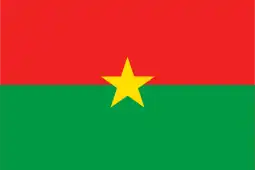Energy in Burkina Faso
Energy in Burkina Faso is sourced primarily from diesel and heavy fuel, with some access to hydropower and solar.[1]
Burkina Faso produced 69 kilotonne of oil equivalent (ktoe) of energy in 2015, 89.8% of which was generated from fossil fuels.[2] Final consumption of electricity was 86 ktoe.[2] The country uses energy from biomass, fossil fuels, hydroelectricity, and solar.[2]
As of 2014, Burkina Faso's total greenhouse gas emissions was at 32.60 million metric tons of carbon dioxide equivalent (MtCO2e).[3] The country has committed to reduce its emissions by at least 7.8 MtCO2e (or 6.6%) by 2030.[3] The country targets 100% of its electricity generation to come from renewable sources by 2050.[4]
Electricity
As of 2008, it is estimated 19% of Burkina Faso have access to electricity.[5] In 2017, French president Emmanuel Macron inaugurated a 33 MW solar plant, that produces electricity for 110,000 households.[6] West Africa's biggest solar plant began operation in Burkina Faso on November 29, 2017.[7]
| Type | installed power (MW) |
|---|---|
| Diesel and heavy fuel oil | 253 |
| Hydropower | 32 |
| Solar | 33 |
| Total | 318 |
Clean fuels for cooking
As of 2020, it is estimated 10.60% of Burkina Faso have access to access to clean fuels for cooking, according to our world in data.[8]
References
- "Power Africa in Burkina Faso | Power Africa | U.S. Agency for International Development". 5 October 2021.
- "Energy Profile: Burkina Faso" (PDF). 2015.
- "Greenhouse Gas Emissions in the West Africa Region" (PDF). April 2019.
- "Renewables 2019: Global Status Report" (PDF). 2019.
- Access to Electricity 1993-2017
- "Macron makes renewable energy push in power-starved Africa". Reuters. 29 November 2017.
- "Burkina Faso launches Sahel region's largest solar power plant". Euractiv. 2017-11-28. Retrieved 2020-05-15.
- Ritchie, Hannah; Roser, Max; Rosado, Pablo (2022-10-27). "Energy". Our World in Data.
